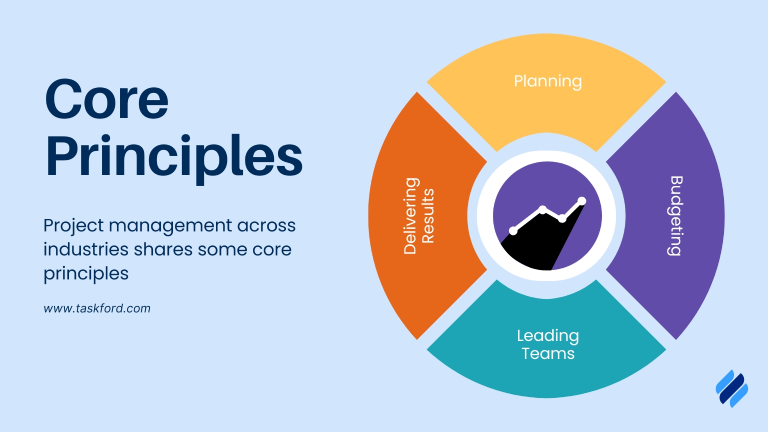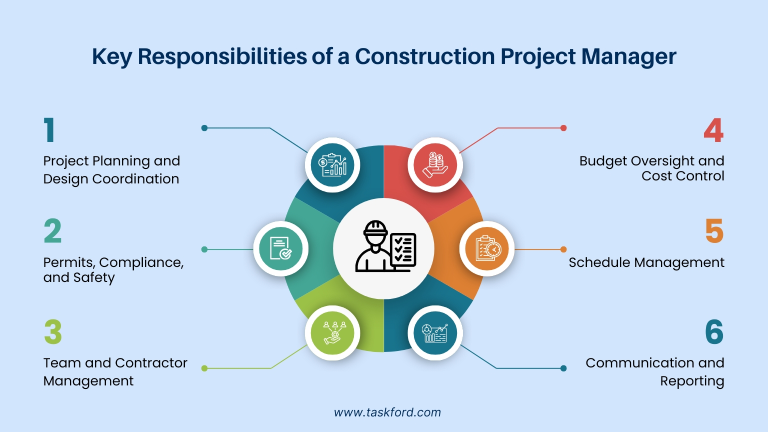Behind the Build: What Construction Project Managers Actually Do?
Discover what a project manager does in a construction company, including key responsibilities, skills, tools, and real-world challenges that define this vital role.
If you’ve ever walked past a construction site and wondered who’s making sure everything gets done on time (and safely), you’re likely thinking about the Project Manager. In construction, this role is absolutely essential — but what does a project manager do in a construction company, exactly?
Whether you’re curious about the job, considering a career in it, or just want to understand better how large building projects come together, this guide will break it all down in a clear, practical way.
Why Construction Project Management is Different
Project management across industries shares some core principles: planning, budgeting, leading teams, and delivering results. But in construction, project management takes place in a more complex and unpredictable environment. It requires coordinating multiple stakeholders, managing strict safety and compliance standards, and adapting to on-site challenges such as weather or material delays.
Success depends on strong planning, clear communication, and effective tools for scheduling, budgeting, and resource management to keep projects on track.

Here’s what makes it uniquely challenging:
- The work is site-based. Project managers handle logistics that change by the hour. Weather, site conditions, equipment availability, and safety issues can alter the day’s plans unexpectedly. This requires agility, problem-solving skills, and a practical mindset.
- Heavy regulatory and safety requirements. Construction projects must comply with a variety of zoning laws, environmental standards, building codes, and safety regulations. Failure to comply can lead to delays, fines, or even full shutdowns.
- Coordination of multiple skilled trades. Unlike many office-based projects, construction relies on a variety of professionals - electricians, plumbers, carpenters, roofers, and more. Their work must be precisely scheduled and aligned to avoid conflicts, downtime, or rework.
This combination of field dynamics, legal requirements, and hands-on management sets construction project management apart from other industries.
The Role of a Construction Project Manager
A Construction Project Manager is the person responsible for leading and overseeing a construction project from start to finish. They manage everything that happens before, during, and after construction – from planning and budgeting to coordinating workers, securing permits, tracking progress, and making sure the project is completed safely, on time, and within budget.
At its core, the role involves turning project plans into reality. Construction PMs are tasked with aligning day-to-day execution with strategic objectives, ensuring that timelines, budgets, safety measures, and quality standards are met. They work closely with all parties involved in the project and maintain control over the entire project lifecycle.
Construction PMs are involved at nearly every stage:
- Collaborating with architects, engineers, clients, and stakeholders
- Interpreting blueprints and setting realistic timelines
- Defining budgets and planning for permits and inspections
- Coordinating teams and subcontractors during execution
- Managing costs and adapting to delays or changes
- Ensuring compliance and final project delivery
What Does a Project Manager Do in a Construction Company?
Let’s take a closer look at the day-to-day responsibilities of a construction project manager. These duties may vary depending on the size of the company and complexity of the project, but generally include:

1. Project Planning and Design Coordination
Before the physical work begins, construction PMs help shape the project. They analyze blueprints and technical drawings, assess feasibility, create budgets, estimate resources, and define timelines. They also work closely with architects and engineers to ensure design plans are executable in the field.
2. Permits, Compliance, and Safety
Navigating the regulatory landscape is a major part of the job. The PM ensures that permits are obtained, environmental impact assessments are completed when required, and safety measures are in place. This includes coordinating with local government bodies and regulatory agencies.
3. Team and Contractor Management
Once construction begins, PMs serve as the central point of coordination for everyone on site. They communicate with general contractors, subcontractors, consultants, and suppliers. They ensure each team knows its responsibilities, timelines, and dependencies on others.
4. Budget Oversight and Cost Control
Managing costs is a constant focus. The PM tracks spending, processes invoices, negotiates with suppliers, and monitors financial forecasts. If a budget issue arises, they must either revise the scope or find efficiencies to stay on track.
5. Schedule Management
Construction projects rely heavily on sequencing—you can’t install drywall before plumbing is roughed in. The PM keeps the schedule moving, anticipates delays, and adjusts timelines as needed to keep progress aligned.
6. Communication and Reporting
A construction PM is the communication bridge between the field and the client. They provide progress updates, lead meetings, document issues, and ensure transparency for all stakeholders involved.
Key Skills of a Successful Construction Project Manager
To thrive in construction project management, technical know-how is important, but it’s only one part of the equation. The role also demands a unique mix of soft and strategic skills that help project managers lead effectively in the fast-paced, unpredictable world of construction.
Here are the key skills that set successful construction project managers apart:
- Strong Communication Skills: PMs must communicate clearly and consistently with clients, tradespeople, vendors, and regulators. Miscommunication can lead to costly delays or safety issues.
- Time and Resource Management: Managing people, equipment, and materials efficiently is essential to staying on schedule.
- Budgeting and Financial Oversight: Understanding how to control costs, forecast spending, and make smart trade-offs keeps projects financially viable.
- Problem-Solving and Risk Management: Every project hits roadblocks. A skilled PM can anticipate issues, stay calm under pressure, and find solutions fast.
- Leadership and Team Coordination: Motivating diverse teams and keeping everyone aligned requires patience, confidence, and trust-building.
- Construction Knowledge: Familiarity with construction processes, materials, codes, and safety practices helps PMs make informed decisions on-site.
- Adaptability: With daily changes on a construction site, flexibility is critical. Great PMs know how to pivot plans without losing momentum.
A construction project manager who blends these skills is well-equipped to lead complex projects from planning through completion, while keeping the team focused and the client satisfied.
Tools That Help Get the Job Done
Modern construction project managers rely on software tools to manage complexity. Platforms like TaskFord help with everything from scheduling and task management to resource planning and document sharing. Other tools, such as Procore or Buildertrend, are built specifically for the construction industry, supporting field collaboration, site reporting, and real-time updates.
Additional tools include:
- Time tracking software for managing labor hours
![]()
- Project dashboards for real-time updates
- Communication apps to streamline team conversations
Selecting the right tools can reduce manual coordination and improve visibility across teams.
Want help choosing the right fit for your team? Check out our guide to the Best Construction Project Management Software to compare features and find what works best for your workflow.
Real-World Challenges Construction PMs Face
No two days are the same on a construction site, and that unpredictability can be both exciting and demanding. For construction project managers, each day brings a new set of variables to navigate, many of which are beyond their control.
Some of the most common real-world challenges include:
- Weather Delays: Rain, snow, or extreme heat can bring work to a halt or limit what crews can safely do on site.
- Equipment Failures: Unexpected breakdowns or unavailability of essential machinery can delay scheduled tasks.
- Material Shortages: Supply chain disruptions can result in delays, increased costs, or forced substitutions that require approvals and adjustments.
- Labor Shortages: Skilled tradespeople may not always be available when needed, especially during high-demand seasons.
- Design Changes Mid-Project: When clients request revisions or unexpected issues surface, PMs must quickly adapt the plan while keeping the timeline and budget intact.
These challenges require project managers to be quick on their feet, resourceful, and highly communicative. A successful PM doesn’t just react to problems—they plan for them in advance, build in contingencies, and keep the project team moving forward with clarity and confidence.
How This Role Connects to the Bigger Project Management Picture
While construction project managers operate in a very specific context, their work aligns closely with broader project management principles. Like PMs in other industries, they are responsible for planning, executing, and closing projects while managing constraints around time, cost, scope, and quality.
What makes their role stand out is the intersection of strategic planning and real-world application. Construction PMs are not just working in abstract frameworks or digital tools—they are on the ground, navigating job sites, solving logistical challenges, and ensuring the physical execution of plans in highly dynamic conditions.
This role also requires a deeper involvement in regulatory compliance and physical safety, which adds layers of complexity beyond what many traditional PMs face. At the same time, construction PMs share the universal responsibilities of:
- Defining project goals and deliverables
- Managing teams and stakeholder expectations
- Tracking progress and mitigating risks
- Delivering results within the agreed scope and timeline
In that way, construction project managers are part of the larger ecosystem of project leaders across industries—only their work results in something you can actually walk into, drive over, or live inside.
Their ability to bring structure to high-stakes, fast-moving environments connects them to the core purpose of project management everywhere: turning vision into reality.
Conclusion
So, what does a project manager do in a construction company? They do everything needed to bring a vision to life. They take a design on paper and turn it into a real, tangible structure—one that people will live in, work in, drive over, or learn inside.
Their role is demanding, complex, and incredibly rewarding. Through careful planning, constant coordination, and daily problem-solving, construction project managers keep the industry moving forward, one project at a time.
Whether you’re exploring this as a career or simply gaining a better appreciation for the buildings around you, understanding the role of a construction PM offers insight into just how much work goes on behind the scenes of every structure we rely on.
Continue Reading
Explore more resources to sharpen your understanding:
- What Does A Project Manager Do? – The core guide to PM roles in all industries
- Best Construction Project Management Software – Compare tools to run your projects better
- How to Use Construction Project Tracking Software to Overcome Schedule Delays – Practical tips for staying on time
- How to Choose the Right Construction Time Tracking App for Your Team – Find the right fit for your job site
Subscribe for Expert Tips
Unlock expert insights and stay ahead with TaskFord. Sign up now to receive valuable tips, strategies, and updates directly in your inbox.